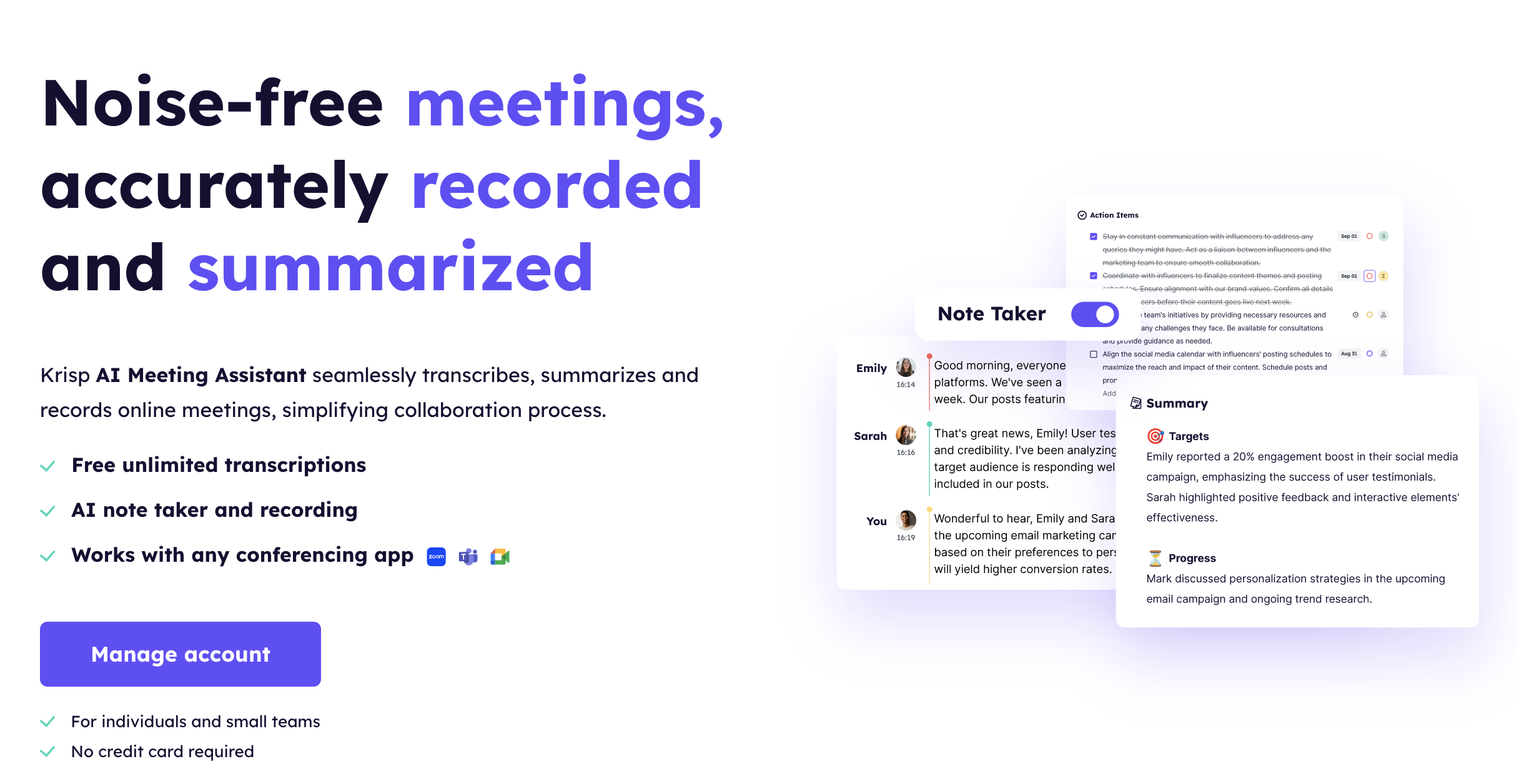Ever wonder why some teams just click while others struggle to get things done? It’s not just luck, it’s all about strong teamwork skills. No matter what job you have, working well with others is key to success. Good communication, problem-solving, and adaptability can make or break a project.
In this guide, we’ll explore 10 essential teamwork skills that help you succeed at work. Plus, we’ll dive into how teamwork works in remote and hybrid environments, and how tools like Krisp’s AI Meeting Assistant can make virtual collaboration smoother and more productive. Let’s get started!
What Are Teamwork Skills?
Think about the best team you’ve ever been part of—what made it work so well? It probably wasn’t just talent but how everyone communicated, collaborated, and supported each other. That’s exactly what teamwork skills are! They’re the abilities that help you work smoothly with others, whether it’s sharing ideas, solving problems together, or handling disagreements without drama.
These skills make teamwork feel effortless, helping projects move forward and keeping work enjoyable. From good communication to adaptability and problem-solving, strong teamwork skills can make a huge difference in how successful (and stress-free) your work life is.
Why Do You Need to Develop Teamwork Skills
Success at work isn’t just about how good you are at your job—it’s about how well you work with others. No matter what industry you’re in, strong teamwork skills help you communicate effectively, solve problems, and build better relationships with colleagues.
Here’s why developing teamwork skills is so important:
- Better Communication – Helps you express ideas clearly and understand others.
- Faster Problem-Solving – Teams that work well together find solutions more efficiently.
- Stronger Workplace Relationships – Builds trust and reduces conflicts.
- Higher Productivity – When everyone collaborates, projects get done faster.
- Career Growth – Employers value team players, opening doors for promotions.
10 Essential Teamwork Skills for Success
Great teams don’t just happen—they’re built on strong teamwork skills that help people communicate, collaborate, and achieve goals together. Whether you’re working in an office or remotely, these skills make all the difference in how smoothly projects run and how enjoyable work feels.
Below are 10 essential teamwork skills that will help you become a more effective team player and boost your professional success.
1. Communication
Clear and effective communication is the backbone of teamwork. It’s not just about talking but also about ensuring your message is understood. Whether it’s explaining a task, sharing feedback, or discussing a project update, strong communication prevents misunderstandings and keeps everyone on the same page.
| Scenario: Imagine Sarah is leading a marketing campaign with her team. She clearly outlines goals, assigns tasks, and encourages open discussions. As a result, the team delivers a successful campaign without confusion or missed deadlines. |
2. Active Listening
Listening isn’t just about hearing words—it’s about truly understanding what’s being said. Active listening means giving full attention, asking questions, and responding thoughtfully. This builds trust and prevents miscommunication.
| Scenario: During a team meeting, Jake listens carefully as his coworker explains a challenge. Instead of jumping in with his own ideas, he asks clarifying questions. This helps the team find a solution faster and ensures everyone feels heard. |
3. Collaboration
Team success depends on how well everyone works together. Collaboration means sharing ideas, supporting each other, and working toward a common goal—instead of focusing only on individual contributions.
| Scenario: A product development team is brainstorming a new app feature. Instead of one person dominating, everyone contributes ideas, building on each other’s input. The result? A well-rounded feature that meets customer needs. |
4. Conflict Resolution
Disagreements happen in any team, but how you handle them makes the difference. Strong conflict resolution skills help turn disagreements into productive discussions instead of workplace drama.
| Scenario: Two designers on a team have different ideas for a project. Instead of arguing, they discuss their perspectives calmly, find common ground, and blend their ideas into a stronger final design. |
5. Emotional Intelligence
Understanding emotions—both yours and others’—helps create a positive team environment. Emotional intelligence includes empathy, self-awareness, and managing emotions in stressful situations.
| Scenario: During a stressful deadline, Olivia notices her teammate is overwhelmed. Instead of pushing for faster work, she offers to help with a few tasks. This small act of empathy improves teamwork and morale. |
6. Adaptability
Work environments change fast, and the best team players stay flexible. Whether it’s adjusting to new tools, shifting priorities, or unexpected challenges, adaptability helps teams move forward.
| Scenario: When a major client changes project requirements last-minute, Mark quickly adjusts the team’s approach instead of panicking. His flexibility ensures the project stays on track. |
7. Problem-Solving
Great teams tackle challenges head-on. Problem-solving skills help you find solutions instead of getting stuck. The best team players approach problems with a positive, solution-focused mindset.
| Scenario: A software bug threatens to delay a product launch. Instead of blaming each other, the development team brainstorms solutions, quickly finds the issue, and fixes it before the deadline. |
8. Accountability
Being a reliable team member means owning your responsibilities and delivering on commitments. Teams thrive when everyone holds themselves accountable and supports each other.
| Scenario: David misses a deadline but immediately takes responsibility. He informs the team, adjusts his schedule, and ensures the project stays on track. His accountability earns respect and trust. |
9. Leadership & Initiative
You don’t have to be a manager to show leadership. Taking initiative, motivating others, and stepping up when needed are key teamwork skills.
| Scenario: During a slow period, Mia notices gaps in the team’s workflow. She suggests a new process to improve efficiency. Her initiative helps the team save time and effort. |
10. Time Management
Good teamwork requires balancing priorities and meeting deadlines. Managing your time well ensures that your work contributes to the team’s overall success.
| Scenario: A sales team is preparing for a big pitch. By planning their time wisely, prioritizing tasks, and avoiding last-minute rushes, they deliver a well-prepared, winning presentation. |
Teamwork Skills in Remote & Hybrid Work Environments
Working in a remote or hybrid setup comes with its own challenges. When you’re not in the same room as your team, communication can get tricky, misunderstandings happen, and collaboration takes extra effort. That’s why strong teamwork skills are even more important in these work environments.
Here’s how you can adapt your teamwork skills for remote and hybrid work while using tools like Krisp’s AI Meeting Assistant to stay productive and connected.
1. Clear Communication is Key
In remote work, you can’t just walk over to someone’s desk to clarify things. You need to be extra clear and concise in emails, chats, and meetings. Over-communication is better than assuming everyone is on the same page.
✅ Tip: Use tools like Slack or Microsoft Teams for quick updates and Krisp’s AI Meeting Assistant to keep your meetings crisp, clear, and distraction-free.
2. Active Listening in Virtual Meetings
It’s easy to zone out in virtual meetings, especially with distractions at home. Active listening—focusing on the speaker, asking clarifying questions, and engaging in the discussion—makes a huge difference.
✅ Tip: Use Krisp’s noise cancellation to block out background noise and stay fully engaged without distractions.
3. Collaboration Across Time Zones
Remote teams often work across different time zones, making real-time collaboration difficult. That’s where async communication (like recorded video updates and shared documents) helps.
✅ Tip: Keep shared documents updated and use tools like Notion or Google Docs for seamless collaboration. Plus, Krisp’s AI Meeting Assistant can generate meeting notes and summaries, so no one misses important updates.

4. Conflict Resolution in Digital Spaces
Without face-to-face interactions, messages can sometimes come across as cold or misinterpreted. If there’s a disagreement, jump on a quick call instead of letting a misunderstanding grow.
✅ Tip: When addressing conflicts, use video calls with Krisp to ensure your voice is clear and professional, without background noise adding distractions.
5. Accountability & Time Management
Without a structured office environment, staying on top of tasks is a personal responsibility. Setting clear goals, using task management tools, and updating your team regularly helps keep everyone aligned.

✅ Tip: Use Krisp’s Meeting Assistant to get automated meeting transcriptions and summaries, so you can focus on work without taking detailed notes yourself.
FAQs
- Communication – Clear and open sharing of ideas.
- Collaboration – Working together effectively.
- Trust – Confidence in each team member’s contributions.
- Respect – Valuing diverse perspectives and skills.
- Commitment – Dedication to shared goals.
- Accountability – Taking responsibility for actions.
- Adaptability – Adjusting to challenges and changes.
1. Communication – Clear and effective sharing of information.
2. Commitment – Dedication to team goals.
3.Collaboration – Working together efficiently.
4.Competence – Each team member’s skills and expertise.
5. Creativity – Thinking outside the box to solve problems.


